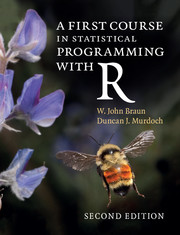Book contents
- Frontmatter
- Contents
- Preface to the second edition
- Preface to the first edition
- 1 Getting started
- 2 Introduction to the R language
- 3 Programming statistical graphics
- 4 Programming with R
- 5 Simulation
- 6 Computational linear algebra
- 7 Numerical optimization
- Appendix Review of random variables and distributions
- Index
Preface to the first edition
Published online by Cambridge University Press: 05 July 2016
- Frontmatter
- Contents
- Preface to the second edition
- Preface to the first edition
- 1 Getting started
- 2 Introduction to the R language
- 3 Programming statistical graphics
- 4 Programming with R
- 5 Simulation
- 6 Computational linear algebra
- 7 Numerical optimization
- Appendix Review of random variables and distributions
- Index
Summary
This text began as notes for a course in statistical computing for second year actuarial and statistical students at the University of Western Ontario. Both authors are interested in statistical computing, both as support for our other research and for its own sake. However, we have found that our students were not learning the right sort of programming basics before they took our classes. At every level from undergraduate through Ph.D., we found that the students were not able to produce simple, reliable programs; that they didn't understand enough about numerical computation to understand how rounding error could influence their results, and that they didn't know how to begin a difficult computational project.
We looked into service courses from other departments, but we found that they emphasized languages and concepts that our students would not use again. Our students need to be comfortable with simple programming so that they can put together a simulation of a stochastic model; they also need to know enough about numerical analysis so that they can do numerical computations reliably. We were unable to find this mix in an existing course, so we designed our own.
We chose to base this text on R. R is an open source computing package which has seen a huge growth in popularity in the last few years. Being open source, it is easily obtainable by students and economical to install in our computing lab. One of us (Murdoch) is a member of the core R development team, and the other (Braun) is a co-author of a book on data analysis using R. These facts made it easy for us to choose R, but we are both strong believers in the idea that there are certain universals of programming, and in this text we try to emphasize those: it is not a manual about programming in R, it is a course in statistical programming that uses R.
Students starting this course are not assumed to have any programming experience or advanced statistical knowledge. They should be familiar with university-level calculus, and should have had exposure to a course in introductory probability, though that could be taken concurrently: the probabilistic concepts start in Chapter 5. (We include a concise appendix reviewing the probabilistic material.) We include some advanced topics in simulation, linear algebra, and optimization that an instructor may choose to skip in a one-semester course offering.
- Type
- Chapter
- Information
- A First Course in Statistical Programming with R , pp. xiii - xivPublisher: Cambridge University PressPrint publication year: 2016



